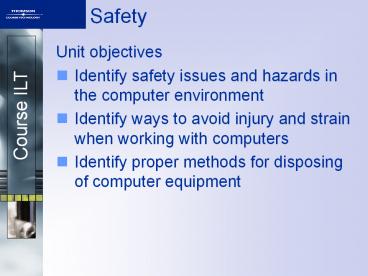Safety - PowerPoint PPT Presentation
1 / 33
Title:
Safety
Description:
Safety Unit objectives Identify safety issues and hazards in the computer environment Identify ways to avoid injury and strain when working with computers – PowerPoint PPT presentation
Number of Views:126
Avg rating:3.0/5.0
Title: Safety
1
Safety
- Unit objectives
- Identify safety issues and hazards in the
computer environment - Identify ways to avoid injury and strain when
working with computers - Identify proper methods for disposing of computer
equipment
2
Topic A
- Topic A Safety and hazards
- Topic B Safe work practices
- Topic C Disposing computer equipment
3
Floor surfaces
- Keep floors level and dry
- Secure carpets to the floor
- Dont cross walkways with cables and power cords
- Use static protection
- Antistatic floor mats
- Static mats under the user's keyboard and/or
computer
4
Static mat
5
Fire safety
- Keep papers orderly
- Keep combustibles away from appliances
- Use working smoke detectors in all areas
- Have appropriate fire extinguishers on hand
6
Fire extinguisher types
- Class A Ordinary compustibles
- Class B Flammable liquids
- Class C Electrical equipment
- Class D Flammable metals
7
Fire extinguisher substances
- Dry chemical
- Halon
- Water
- CO2
8
Fire extinguisher label
9
Electrical safety
- Avoid overloading electrical circuits
- Label breakers
- Use surge protectors and Universal Power Supplies
- Avoid stringing together power strips
- Avoid running electrical cords or network cables
across walkways - Encase cables across walkways in a cord protector
- Provide good ventilation for computer equipment
- Secure cords, lines, cables out of the way
10
Overloaded circuits
11
Air quality
- Use fans to keep the air clear
- Avoid smoking around computers
- Place working carbon monoxide detectors
throughout the building
12
A carbon monoxide detector
13
Computer hazards
- Physical hazards
- Laser and copier toner
- Electromagnetic hazards
14
Incident reporting
- Establish policies
- Necessary for
- OSHA
- Workers compensation claims
- Insurance
15
Activity A-1
Identifying typical office and computer-related
hazards
16
High-voltage interference
- Outside interference
- Inside interference
17
Electrostatic Discharge (ESD)
- Occurs whenever static charge on two objects is
dissimilar - If the two objects touch, electricity from higher
voltage charge flows to lower voltage charge
until charges are equalized - Can attain very high voltages
- If you touch metal object and feel electric
discharge, voltage difference was 3,000 volts or
more - If spark visible when discharge occurred, voltage
difference was at least 8,000 volts
18
Electromagnetic induction
- From fluorescent lights
- Electromagnetic field can induce a similar
current in other nearby objects - Network cables
- Electronic equipment
- Induction currents in network wiring can destroy
data and can damage equipment
19
Minimizing high-voltage interference
- Maintenance
- Install ground wires
- Use anti static devices
20
Shielding and filtering
- Shielding applies primarily to a networks cables
and is actually a refined form of grounding - Filters are electronic devices designed to permit
the normal function of a device, but they block
or suppress any other signal coming from it
21
Activity A-2
Finding sources of static electricity and
interference
22
MSDS
- Physical data
- Toxicity
- Health effects
- First aid
- Reactivity
- Storage
- Disposal
- Protective equipment
- Spill/leakage procedures
23
MSDS hazard ratings
Rating Description
None No potential hazard in this category
0 The least hazard
1 A slight hazard
2 A moderate hazard
3 Highly hazardous
4 Extremely hazardous
24
Personal protection by rating
Rating Description
A Wear goggles when using this product
B Wear goggles and gloves when using this product
C Wear goggles, gloves, and other protective gear when using this product
25
Activity A-3
Reading a material safety data sheet
26
Topic B
- Topic A Safety and hazards
- Topic B Safe work practices
- Topic C Disposing of computer equipment
27
Ergonomic workstations
- Check position of
- Chair
- Monitor
- Keyboard
- Mouse
- Document holders
- Office equipment
- Phones
- Other equipment
28
Laptop safety
- Weight
- Ergonomic issues
- Heat
29
Activity B-1
Avoiding injury and strain when working with PCs
30
Topic C
- Topic A Safety and hazards
- Topic B Safe work practices
- Topic C Disposing of computer equipment
31
Computer equipment disposal
- Disposal of electronics
- Hazardous materials
- Disposing of used toner and ink cartridges
- Disposal of computer equipment
- Reusing equipment
- Methods of disposal
32
Activity C-1
Selecting the proper methods for computer
equipment disposal
33
Unit summary
- Identified safety issues and hazards in the
computer environment - Identified ways to avoid injury and strain when
working with computers - Identified proper methods for disposing of
computer equipment

